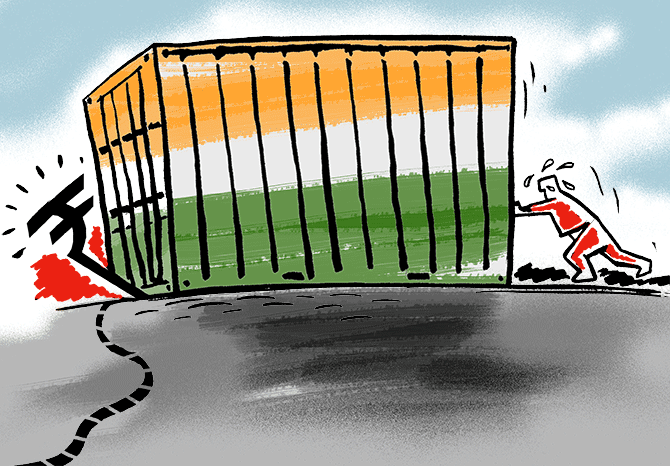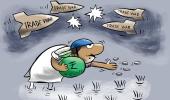'We believe that in the new world order FTAs or bilateral trade agreements (BTAs) are the way forward.
They are enablers for our participation in global value chains. Today, around 70 per cent of global trade is tied to these chains.'

Sanjiv Puri, president of the Confederation of Indian Industry (CII), in conversation with Ruchika Chitravanshi/Business Standard in New Delhi, said the India-UK free trade agreement (FTA) has set a template for future deals and will create opportunities for India to build alternative supply chains.
He also said price changes due to high input costs may remain measured, given the soft demand environment.
How do you see the growth scenario evolving in 2025-26?
Economic growth rates in many parts of the world remain weak, including in China.
The good news is that India is on a strong footing. The economy is resilient.
Food inflation, which had been sticky, is now in a much better position, with weather forecasts looking favourable. Hopefully, food inflation will be more contained.
There is also a concession on personal income tax, and we will begin to see the cumulative impact of investments that have picked up.
Even in terms of private capital expenditure, announcements are far higher than they were pre-pandemic.
Geoeconomics and geopolitics remain the big unknowns. And while the weather outlook is encouraging, climate change is a reality.
I expect the situation to improve over the next couple of quarters.
What is the industry mood on the India-Pakistan conflict? Do you think it will add another layer of uncertainty to the already volatile geopolitical situation and impact private investment?
National security is the top priority. Everything else comes after.
We welcome the announcement of the ceasefire between India and Pakistan and commend the Government of India (GoI) for its impactful yet measured diplomatic and security response to recent hostilities.
The prime minister has taken swift, decisive, and responsible steps to secure the nation and its people, sending a clear message that terrorism will not be tolerated and will be dealt with firmly.
CII stands in full solidarity with GoI and salutes the Indian armed forces for their courage, dedication, and tireless efforts.

What do you think of the India-UK FTA?
It's a historic deal. It's the first time India has signed such a comprehensive agreement, offering access to 99 per cent of tariff lines.
In many ways, it sets a gold standard -- or a template -- for future trade agreements.
It is also important because it's between the fifth- and sixth-largest economies in the world.
If India is to play a larger global role, we must integrate into global value chains, and this kind of FTA enables that.
We should look at opportunities to build alternative supply chains. The world is seeking supply chain resilience, and as we scale up, there's a real opportunity for greater value addition in the economy.
On the services front, India is now on equal footing with other countries.
Also, the opening of agricultural tariff lines will create new opportunities for micro, small, and medium enterprises, particularly within global value chains.
According to the FTA, India has agreed to reduce automotive (auto) tariffs from 100 per cent to 10 per cent in a phased manner. How do you see this? Will the domestic auto industry be adversely impacted?
Since the fine print is not yet available, it's difficult to comment on specifics. But such agreements go through a significant consultative process, so I would assume that all concerns have been factored in.
One sector expected to benefit is apparel, as this agreement puts us on a par with Bangladesh and Vietnam.
How is Indian industry dealing with tariffs imposed by the Trump administration?
Let me begin by complimenting the Indian government on how it handled the situation.
According to reports, negotiations are progressing quickly, and we may see a breakthrough soon. It's been a case of very astute management.
We believe that in the new world order -- some economists call it 'disorder' -- FTAs or bilateral trade agreements (BTAs) are the way forward.
They are enablers for our participation in global value chains. Today, around 70 per cent of global trade is tied to these chains.
If you look at the number of overseas delegations that have visited India recently, it's quite substantial -- possibly unprecedented.
What the world needs today is resilient supply chains. India is well-positioned to sign bilateral agreements that serve mutual interests.
While uncertainty is never good for business, I believe this is a temporary phase.
What should India push for in these deals?
As we've seen in the UK deal, 90 per cent of the tariff lines are covered.
I expect other bilateral agreements to have similarly wide coverage.
How do you see urban and rural demand evolving?
Urban demand should improve over the next couple of quarters. Rural demand will also pick up, thanks to better farm incomes.
The positives for urban demand include lower interest rates, moderated food inflation, personal income tax relief, and the cumulative impact of investments.
Of course, the benefits of these investments take time to show.
One risk is that if China dumps stock into India, it will affect export opportunities for Indian manufacturers.
Do you expect price hikes due to high input costs?
It depends on how things evolve. Based on current trends, price increases should remain limited.
That said, demand is somewhat soft, so price changes are being approached cautiously.
In many cases, businesses may not pass on the full burden of costs and instead focus on internal efficiencies to manage the impact. We're dealing with this in a calibrated and measured manner.
Feature Presentation: Rajesh Alva/Rediff











